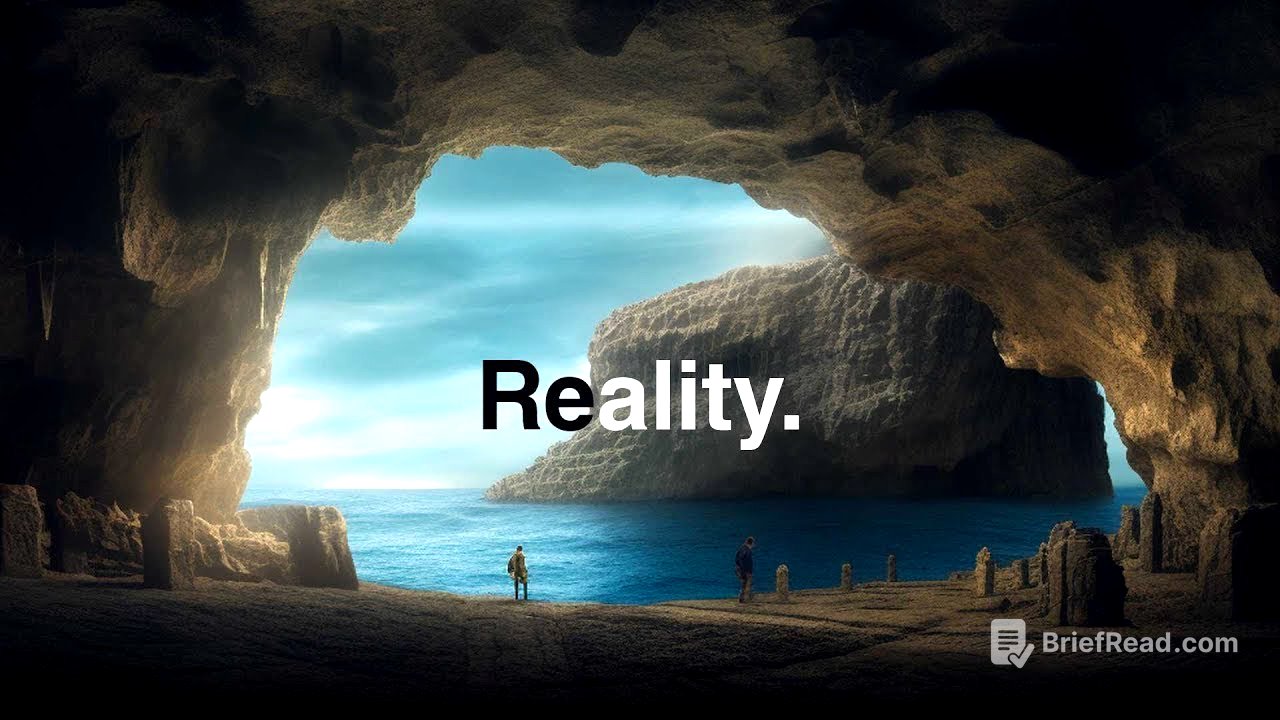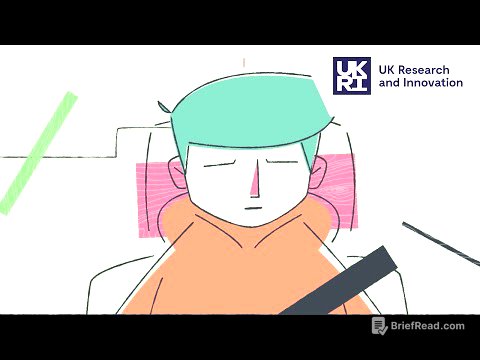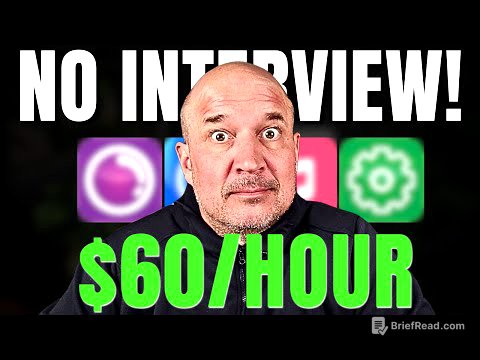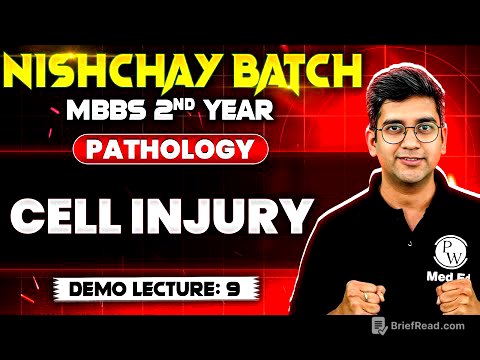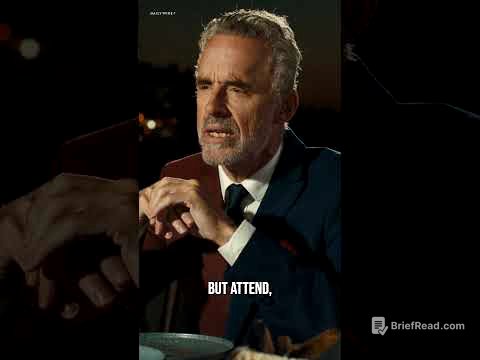TLDR;
This YouTube video by Aperture explores various philosophical concepts, from stoicism and nihilism to hedonism, flow state, and antenatalism. It examines how these philosophies can influence our understanding of life, suffering, happiness, and the meaning of existence. The video encourages viewers to reflect on their beliefs and actions, and to find a way to cope with the challenges of life while making the most of their time.
- Stoicism teaches acceptance and control over one's reactions to external events.
- Nihilism questions the meaning of life and the validity of values.
- Hedonism explores the pursuit of pleasure and the avoidance of pain.
- Flow state describes a state of deep immersion and focus.
- Antenatalism raises ethical questions about procreation and the prevention of suffering.
The Core of Stoicism [0:01]
The video introduces stoicism through the story of Zeno, who lost his wealth in a shipwreck but chose to maintain composure rather than succumb to negative emotions. Stoicism emphasizes acceptance and indifference to external events, focusing on controlling one's reactions. It's not about being unemotional, but about understanding and navigating the world. Stoic principles, applicable across social classes, promote unity and equality, allowing anyone to learn and practice them.
Unexpected Turns of Events [3:25]
Stoicism helps process negative emotions by expecting that bad things will happen and preparing for the worst outcomes. Voluntary discomfort, such as sleeping on the floor or taking cold showers, increases gratitude and prepares one mentally for future misfortunes. In a world of constant advertising and unrealistic expectations, stoicism encourages self-improvement for intrinsic value, detaching from external hopes to avoid disappointment. Happiness should be based on intrinsic human value rather than external possessions or achievements.
The Dichotomy of Control [6:52]
The dichotomy of control, a key stoic principle, involves distinguishing between what we can and cannot control. Success should be judged by effort rather than external outcomes. Reframing one's mindset is crucial; a true stoic values a comfortable life without excessive material possessions. The four main virtues of stoicism are wisdom, courage, temperance, and justice. Nelson Mandela, influenced by Marcus Aurelius, exemplified stoicism by choosing reconciliation over revenge after his imprisonment.
Stoicism in Modern Day Medicine [10:51]
Stoicism is foundational in modern therapies like rationally emotive behavior therapy (REBT) and logotherapy. REBT identifies and challenges negative thought patterns, replacing them with healthier beliefs. Logotherapy, based on the stoic principle of purpose, helps individuals find meaning in life, even in difficult situations. This involves rewiring thought patterns and redirecting the definition of value to what one can control, leading to a happier and more fulfilling life.
The Meaning of Life [12:22]
The video explores the question of life's meaning, acknowledging the uncertainty of our past and future. Various ideologies, such as religion, love, and the existence of life itself, offer comfort, while nihilism suggests life is meaningless. Nihilistic thoughts often arise when questioning old beliefs and forming new ones. The video encourages viewers to examine their core values and question their origins, potentially leading to the conclusion that there is no inherent meaning.
The Ideology of Nothing [15:22]
Nihilism, the ideology of nothing, differs from pessimism, cynicism, and apathy. Pessimists believe in good but doubt human capacity for it, while cynics believe people are motivated by self-interest. Apathetic individuals simply don't care about life's meaning. Nihilism posits no grand design or purpose, leading to the paradox that believing in nothing becomes a belief in itself. Different types of nihilism include political, ethical, and existential nihilism, each with distinct views on societal structures and individual freedom.
The Existential Horror [19:21]
The video discusses the existential horror of accepting that life is meaningless, questioning the value of achievements and experiences. Friedrich Nietzsche argued both for and against nihilism, seeing it as a breakdown of civilization but also as an opportunity to create a new morality. The video warns of the dangers of nihilism, citing historical examples of destructive civilizations, and suggests that a new morality is needed to move forward as a species.
Consciousness [24:07]
Consciousness, our awareness and understanding, often leaves out important information. Humans evolved through networking and form societies with diverse skills. We are customizable, able to mold ourselves into who we want to be. To understand the universe, one must give up the ego and see things for what they are. The video suggests that we are all fundamentally connected and that our individual existence is not an accident.
Are You the Victim or Are You the World [27:27]
The video explores the idea that everyone is fundamentally the universe pretending to be separate. Our consciousness often forgets what's behind our eyes, and a mind that hasn't gone deep enough cannot find the answers to life's big questions. By reframing our mindset, we can see that we are not just a small speck but were present at the very beginning of the universe. Everyone we meet is a part of the universe, and we are all different manifestations of the same thing.
Ego Death [31:28]
The video discusses ego death, the complete loss of subjective self-identity, often induced through psychedelic drugs. During ego death, the world is no longer divided into "myself" and "not myself," and there is only awareness of existence. This experience can be both scary and enlightening, offering a glimpse into a reality free of personal flaws and responsibilities. The video concludes that nothing in life really matters, and fear comes from not making peace with the chaos of the universe.
Marcus Aurelius [36:28]
The video shifts to Marcus Aurelius, a stoic philosopher and Roman Emperor, who led the empire through the Antonine Plague and other crises. Aurelius practiced self-control and inspired his people to remain calm. He forgave his enemies and acted justly, guided by stoic principles. His personal diaries, "Meditations," offer advice on wisdom, courage, temperance, and justice, emphasizing the dichotomy of control.
The Things You Think About [40:21]
The video presents five key lessons from Marcus Aurelius's "Meditations." First, the quality of your mind is determined by your thoughts, and you can control your perceptions. Second, refrain from imitation and be virtuous instead of despising those who despise you. Third, turn obstacles into opportunities for growth. Fourth, accept your fate and love the people with whom fate brings you together. Finally, accept your mortality and live a life of virtue and gratitude.
Hedonism [47:05]
The video explores hedonism, the pursuit of pleasure and avoidance of pain, starting with aristipus of Cyrene, who advocated for immediate gratification. Epicurus redefined pleasure as tranquility, emphasizing the absence of pain as pleasure. Hedonistic teachings distinguish between moving pleasure (satisfying a desire) and static pleasure (tranquility after satisfaction). The video questions whether pleasure is the only source of intrinsic value, considering things like meaning, relationships, and moral beliefs.
The Pleasure Giving Machine [54:10]
The video discusses the limitations of hedonism, noting that people often choose reality with pain over imagined pleasure. The best memories often involve both pleasure and pain, a mix that hedonism doesn't account for. Pleasure is an insatiable desire that can lead to addiction. However, the video suggests making the best of today by enjoying everyday pleasures, as tomorrow is not promised.
Flow [57:45]
The video introduces the concept of flow, a state of deep immersion and focus where the outside world fades away. Achieving flow requires a balance between challenge and skill. The video suggests creating rituals, practicing meditation, and introducing novelty or risk to trigger flow. Group flow involves a team merging together as one, with a balance of skills among members.
The Brain in a Flow State [1:04:50]
In a flow state, the brain receives constant hits of dopamine, reducing fatigue and discomfort. The locus ceruleus norepinephrine (lcne) system regulates engagement with the task. The benefits of flow include increased motivation, creativity, and learning. Flow is also being used in medical research to help patients with cognitive optimization and neurological rehabilitation. However, the video cautions against obsessing over finding flow, as it can be difficult and frustrating.
Antenatalism [1:08:57]
The video explores antenatalism, the belief that human procreation is unethical, as it inevitably leads to suffering. David Benatar argues that the only way to prevent suffering is not to exist in the first place. Antenatalist arguments include sparing The Unborn from suffering and preventing future harm to others and the environment. The video discusses the asymmetry between pleasure and suffering, and the hypothetical consent argument, which states that no one can consent to being born.
Did You Choose to Be Born [1:14:20]
The video presents counterclaims to antenatalism, including pseudoscientific studies suggesting that individuals choose to be born. It also discusses the story of gold Nana, which illustrates the hypothetical consent argument, questioning whether it is better to experience pain and pleasure or not any at all. The video emphasizes the importance of defining suffering.
The Problem of Evil [1:17:30]
The video explores the problem of evil, as presented by Fyodor Dostoevsky in "The Brothers Karamazov," which questions the existence of an omniscient and benevolent God in the face of suffering. Antenatalists argue that the origin or meaning of suffering is irrelevant in the face of its devastation. The video suggests that assigning meaning to suffering can be a powerful coping mechanism. Ultimately, the actions we take in the face of suffering matter more than our intellectual beliefs about it.
